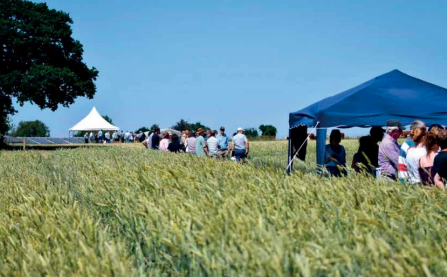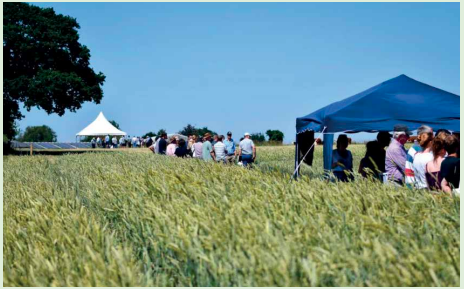By Richard Harding
Organic’s potential for whole farm improvements came under focus at the UK’s largest organic on-farm event
The 2018 National Organic Combinable Crops (NOCC) conference brought organic and non-organic growers together to hear the benefits organic systems bring to the farm business and the farmed environment. It is noticeable again this year the increasing number of farmers and agronomists practicing Conservation Agriculture who have become regular attendees. Held by Organic Farmers & Growers at Green Acres Farm in Shifnal near Telford, Shropshire. The day took place on another extremely hot July day, NOCC featured experts from across the production and supply chain. The day began with first speaker NIAB’s head of farm research Liz Stockdale, who discussed the organisation’s £1m, five-year project to improve understanding of soil health and biology as part of a whole eco system management. Liz is someone who has a natural gift to make a complex subject easily understood by all.

It is always welcomed by organic and conventional growers alike to reinforce the importance of soil biology as the driver of a sustainable farm business. Joel Williams an independent plant and soil educator followed Liz in echoing the importance of soil as a complex ecosystem and drilled down further into the integral relationship between the soil biology, chemistry and physics. Stating “they all have equal importance”. As with any farm system effective marketing is crucial. Lawrence Morden of seed merchant Walnes, joined the line-up to discuss the company’s project with farmer collective Organic Arable to develop plant varieties which will thrive equally in low-input regimes or an organic systems.
This year’s renowned NOCC lunch was provided by Kimberley Bell of the award-winning Small Food Bakery. As a conventional agronomist it is very noticeable the stark difference between the quality and care taken over food at organic events compared to conventional grower meetings. Kimberley and her team, who won Best Food Producer at the previous month’s BBC Food and Farming Awards, included many of the key crops grown on the farm in their menu to demonstrate the bakery’s approach to reconnecting food with the farmers who produce it.
The day was rounded-off with a farm walk, looking in detail at NOCC host Mark Lea’s business, which includes a green waste composting operation. It was a chance to look in detail at all the crops being trialed on the farm. These including wheat varieties Evolution and Spyder, KWS Basset, Crispin, Montana and Siskin, as well as the results of a bicropping trial of peas and triticale. The triticale being used to hold the peas up making harvest easier and improving the overall quality of the peas.
Mark explained “We’re always interested in trying different things on the farm, and hosting NOCC has given us even more motivation to experiment with what we trial here”. “Being organic has opened up a huge number of opportunities for us, not just in terms of what we grow and our production cycles, but also in how we manage the land to ensure that it is in the best possible state to produce food.” OF&G chief executive Roger Kerr explained that NOCC – which is now in its 11th year – has long been the highlight of the organic farming calendar.
With so much uncertainty on the horizon, all farmers could benefit from learning more about the developments and opportunities offered by this system. “A profitable and successful farm businesses need to be resilient in terms of economics, agronomy, and the environment,” he says. “Organic farming simultaneously offers all of these and in the face of major challenges, farmers need to build greater resilience into their businesses.” Whatever your views on Organic farming NOCC always provides an opportunity for farmers to come together and learn from each other whatever their system. It’s also a place to get new ideas and leave inspired by what is possible when you work more closely with nature. However, it is also a cautious reminder of why many farmers are addicted to a solution in a can. Here’s looking forward to next year and I hope to see you there
